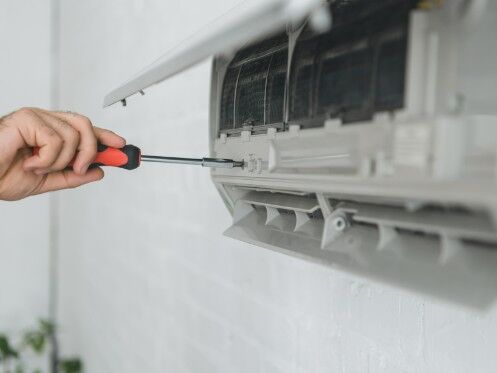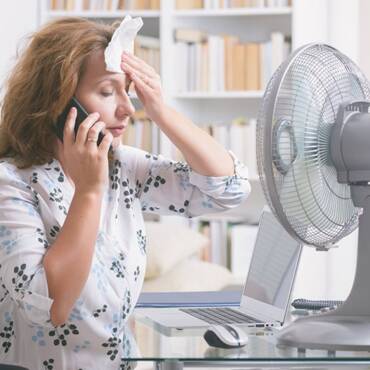October 21, 2024
Installing a ductless heat pump in your home or commercial building is a great investment in your comfort. Unlike a central heat pump, a ductless heat pump system pumps hot and cool air directly out into each room instead of moving air around the building through a series of ducts. While central HVAC may still be the better option in some situations, this article will look at the times when investing in a ductless heat pump is a great choice.
1. Your Heating and Cooling Bills Are Too High
One of the biggest advantages a ductless heat pump system has over central HVAC is in terms of energy efficiency and how much it costs to run. Any heat pump system is almost always going to be the cheapest option for heating your home or business, especially in a place like Portland where you rarely have to deal with freezing temperatures. Nonetheless, a quality ductless heat pump system will often have a much higher energy-efficiency rating for both heating and cooling compared to even the very best central heat pump.
One of the main reasons that a ductless system is able to work so efficiently is that each of the system’s air handlers directly heats or cools the surrounding space. With a central HVAC system, you just have one large air handler that pumps hot or cold air out into the air ducts where it then gets circulated throughout the building. The issue with this is that the hot air coming out of the air handler always ends up gaining or losing some heat as it travels through the ducts. When your AC is running in the summer, the air traveling through the ducts gets warmer due to the ducts being surrounded by warmer air. When your heating is running in the winter, the air ends up cooling down before it flows out of the vents since the air surrounding the ducts is much cooler than the air flowing through them.
The result of this heat loss/gain is that it takes a central HVAC system longer to fully cool or heat the building than it would for a ductless system. Another issue with central HVAC systems is that many of them have duct leaks or ducts that are larger or smaller than they should be, and these issues also contribute to energy waste and decreased efficiency.
One final reason why a ductless system can work more efficiently is that each air handler only monitors and controls the temperature of the space it’s in. This allows you to reduce the amount of energy the system uses by turning the temperature up or down in unoccupied areas or rooms you rarely use. It also means that some of the air handlers may never need to run for all that long since you’ll usually have some areas that get heated or cooled much faster. The heat pump itself will still run as long as necessary so you don’t end up with issues with it short cycling, but certain air handlers will typically turn off before the others do.
2. Your Building Often Has Hot and Cold Spots
One major issue that many central HVAC systems have is that they struggle to keep every room at the same temperature for various reasons. One reason is that you usually have some rooms that will start heating back up or again cooling down at a faster rate as soon as the central HVAC system shuts off, which can happen due to poor insulation or the room having numerous windows that allow heat in. The result of these issues is that you can end up with some rooms being hotter or colder than others and not being as comfortable as you want.
Upgrading to a ductless heat pump system is the most effective option for eliminating hot and cold spots in your home or business. If you have a room that tends to heat up much faster due to having large windows or skylights or is often much cooler for whatever reason, the air handler in that space will run as much as it needs to maintain your desired temperature.
3.You’re Dealing With Indoor Air Quality Issues
While a ductless heat pump technically won’t help you overcome indoor air quality issues, it also won’t contribute to these issues like a central HVAC system does. Every home or business contains a wide variety of allergens and airborne pollutants that negatively impact indoor air quality. For instance, pollutants are released into the air every time you cook or use chemical cleaning products. The problem if you have a central HVAC system is that it ends up drawing in the pollutants through its return duct system and then circulating them into every part of the building.
The only way to avoid this is by upgrading to a much more efficient filtration system since standard central HVAC air filters mostly only trap dust and larger particles while many other allergens and pollutants are small enough to pass through the filter unimpeded.
With a ductless HVAC system, you won’t have to worry as much about everything getting circulated around the entire building since each air handler again only circulates air throughout the space it’s in. That means whatever allergens and pollutants are present in that space remain confined. This is especially helpful in certain types of commercial buildings where some areas have a much higher concentration of pollutants due to things like machinery or office equipment like printers and copiers, both of which release a fairly large amount of volatile chemical pollutants into the air.
4. You’re Putting an Addition on Your Building
If you’re putting an addition on your home or business, a single-zone ductless heat pump system with one air handler is definitely going to be the most economical option for ensuring it has sufficient heating and air conditioning. The issue with an addition is that it obviously increases the total amount of space that your existing HVAC system has to heat and cool. Unless the extension is quite small or your HVAC is fairly oversized, you’ll usually find that your existing HVAC is no longer sufficient due to the addition increasing your heating and cooling requirements.
If your HVAC system isn’t sufficiently sized to handle the extra space, it means your energy bills will likely increase since it will now take the system longer to heat and cool the building. The longer run times also mean that your HVAC units may end up wearing out sooner and be more at risk of breaking down. The only way you could normally avoid these issues would be to upgrade to a larger HVAC system, which is always going to cost you more than just installing a single-zone ductless system to heat and cool the new addition.
For the past 35 years, Climate Control has been putting our expertise toward helping residential and commercial customers in Portland with all of their indoor comfort needs. We offer expert HVAC installation services and can help you decide if a ductless heat pump system is the right choice for your home or business. You can also count on our team of experienced, NATE-certified technicians whenever you need any heating or air conditioning maintenance or repairs. If you’re considering installing a ductless heat pump system, contact us today to schedule an evaluation and consultation.
Whether you require installation, repair, or maintenance, our technicians will assist you with top-quality service at any time of the day or night. Take comfort in knowing your indoor air quality is the best it can be with MOE heating & cooling services Ontario's solution for heating, air conditioning, and ventilation that’s cooler than the rest.
Contact us to schedule a visit. Our qualified team of technicians, are always ready to help you and guide you for heating and cooling issues. Weather you want to replace an old furnace or install a brand new air conditioner, we are here to help you. Our main office is at Kitchener but we can service most of Ontario's cities
Source link



